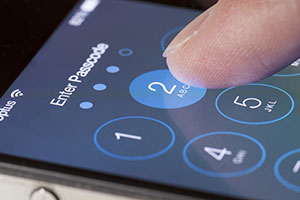Protect the Information on Your Smartphone

Protect the Information on Your Smartphone
Our smartphones are capable of many things: email, shopping, banking, apps and storing information. These features are great for getting things done on the go, but can expose you to identity theft, unless you take some precautions.
Here are some things you can do to help prevent having your identity stolen:
- Always keep track of your phone, and don’t leave it out or carry it openly in crowded places.
- Use your phone’s lock screen feature. It’s like a padlock for the information inside.
- Don’t set up your phone to automatically log in to sensitive accounts, and be sure to log out immediately when you’re done using things like mobile banking or shopping online.
- Don’t store sensitive information on your phone. That means you shouldn’t have an easily accessible file listing your passwords. This includes information like; checking and savings account numbers and passwords, credit or debit card numbers, your Social Security number; or any data about you or people you know that could be misused if your phone is lost or stolen.
- Avoid banking or making purchases over free public Wi-Fi networks. It’s safer to use your 4G or 3G networks or, wait until you get home and use your own Internet connection.
- Download apps from trusted sources such as the Apple Store or Google Play, and be sure to install updates when available because some fixes are made to improve security.
- Use software such as ‘Find My iPhone’ for iPhones, and Android Device Manager or Lookout for Android phones in the event that it is lost or stolen.
Be sure to call your phone provider and let them know if your phone is lost or stolen. Don’t forget to mention if you did happen to store credit card, or other sensitive information. Contact your bank or credit union if that is the case.
Make the right call... guard the information on your smartphone to help protect yourself from identity theft.
« Return to "CFFCU Blog"
Go to main navigation
